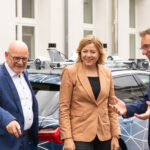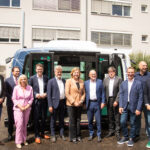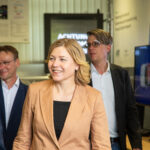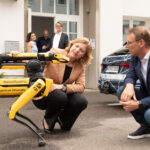Focus on Cross-Border Autonomous Driving
EU Vice-President Henna Virkkunen visits the FZI and the Test Area Autonomous Driving Baden-Württemberg
High-ranking guest at the FZI: Henna Virkkunen — Vice-President for Tech Sovereignty, Security and Democracy, and Commissioner for Digital and Frontier Technologies — met with Baden-Württemberg’s Minister of Transport Winfried Hermann to learn more about the Test Area Autonomous Driving Baden-Württemberg. Digital sovereignty, technological independence, security, and democracy fall within the remit of her commission — topics that are the focus of research at the FZI.
Digital mobility requires research and development
The Test Area Autonomous Driving Baden-Württemberg (TAF BW) demonstrates how — thanks to the collaboration with the mobility partners in the TechnologieRegion Karlsruhe — tomorrow’s digital mobility can be implemented successfully. While the FZI has the scientific lead of the TAF BW, the operation of this unique real-world laboratory is in the hands of the Karlsruhe Transport Authority (KVV). The ride at the Test Area Autonomous Driving Baden-Württemberg and the tour of the FZI Living Lab Future Mobility were accompanied by discussion focusing on research and development in the field of digital mobility and its system-relevant components. Participants from Karlsruhe, including Mayor Dr. Frank Mentrup, KVV CEO Professor Alexander Pischon, KIT Vice President Professor Hirth and Dr. Petra Jung-Erceg from the Karlsruhe TechnologyRegion, pointed out the importance of research and development and the excellent potential offered by a joint pre-development to avoid isolated solutions.
FZI Executive Director Zöllner: Testing grounds are of key importance
During her visit to the FZI Research Center for Information Technology, responsible for the scientific lead of the test field’s design, planning, and expansion, the EU Vice President took a ride through the real-world laboratory in an autonomous FZI research vehicle. FZI Executive Director Professor Johann Marius Zöllner endorsed the call for greater European cooperation:
“In the field of automated and connected mobility, Europe must stay competitive, sovereign, and attractive for providers. A harmonized European cross-border mobility will only succeed if we put our efforts into addressing the organizational, technical, and methodological conditions as well as the regulatory and social conditions. It is not just about autonomous driving itself, but also about safety, approval, and operation. Close cooperation at European level as well as testing grounds, for example a cross-border test field, are key requirements to advance innovative technologies in passenger and freight transport across borders and develop autonomous mobility solutions for Europe within Europe under real-world conditions.”
FZI Executive Director Prof. Dr.-Ing. Johann Marius Zöllner
Commitment to cross-border EU test area for autonomous driving in Karlsruhe
On the occasion of EU Vice-President Henna Virkkunen’s visit to the Test Area Autonomous Driving Baden-Württemberg, Transport Minister Winfried Hermann reaffirmed the state’s commitment to a European test area in Karlsruhe: “Autonomous shuttle buses offer new opportunities for public transport. In the future, they can help to improve connections to rural regions and locations during off-peak hours. If we want to go our own way in using this new technology, the pooling of Europe’s innovative strength for autonomous driving and promoting this future technology across national borders is both possible and imperative. Otherwise, we will be left behind in international competition with the US and Asian players.” Test environments like those offered by the TAF BW in Karlsruhe, Bruchsal, and Heilbronn are essential in this context. “At the test environments, research is being conducted with real data to determine how autonomous driving can be made even safer and more efficient.” Minister President Winfried Kretschmann and Minister Hermann previously advocated at the EU level for a cross-border EU test field in Karlsruhe. Overall, Baden-Württemberg offers ideal conditions with its strong automotive cluster, an excellent research landscape, many years of expertise in the TAF BW real-world laboratory for automated and connected driving, and the immediate proximity to France.
Establishing the prerequisits at the European level
The state government is now calling for the necessary prerequisites to be established at the European level. So far, there are no binding rules for cross-border operations such as real-world testing in public spaces. Transport Minister Hermann emphasized: “The EU Commission’s Action Plan is a good start. However, the Commission and the regions must also bring it to life so we can catch up with the international pioneers and maintain our technological independence. To stay on track, we also need tailwind from Brussels. I am delighted that we had the opportunity to show EU Vice-President Virkkunen our excellent testing environment today.”
About the FZI
The FZI Research Center for Information Technology, with headquarters in Karlsruhe and a branch office in Berlin, is a non-profit institution for information technology application research and technology transfer. It delivers the latest scientific findings in information technology to companies and public institutions and qualifies individuals for academic and business careers or the leap into self-employment. Supervised by professors from various faculties, the research groups at the FZI develop interdisciplinary concepts, software, hardware and system solutions for their clients and implement the solutions found as prototypes. The FZI House of Living Labs provides a unique research environment for application research. The FZI is an innovation partner of the Karlsruhe Institute of Technology (KIT) and strategic partner of the German Informatics Society (GI).
More information:
Download media:
Click on media for download.





